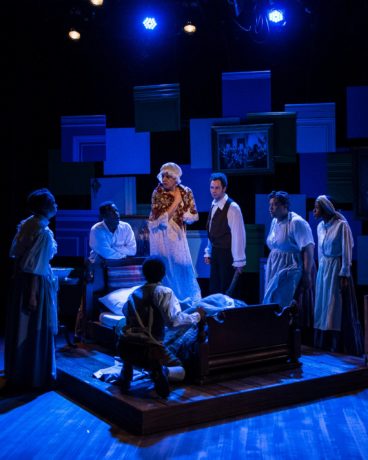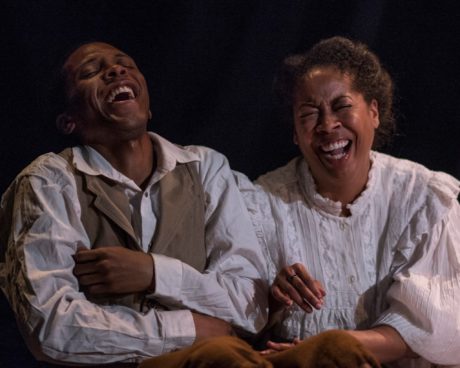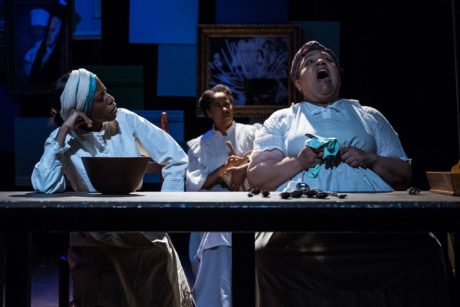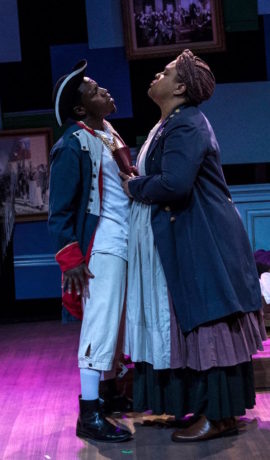“I do believe you darkies are trying to kill me,” says Martha Washington to her house slaves in this fantastical-historical play, just opened in a sensationally cheeky production at the new Ally Theatre Company. Martha has reason to be concerned.

Philadelphia Playwright James Ijames, a 2017 Whiting Award recipient, made up the script’s surreal story: George Washington’s frail widow lies in her sick bed having a fever dream populated by an antic assortment of black people. They appear to be waiting on her but really they are waiting for her to die, because by the terms of her husband’s will, they are then to be freed. So they pass the time messing with her head, playing out a wild series of comic sketches, and thoroughly entertaining the rest of us.
Ijames didn’t make up Martha’s paranoia, however, nor George’s will. She penned her panic in a letter that centuries later prompted Ijames to pen this play. Lucky for American theater he did too, because The Most Spectacularly Lamentable Trial of Miz Martha Washington is an extraordinary dark comedy about slavery in America. It compares to the act-of-imagination ingredients in works by other young African American dramatists—such as Brandon Jacobs-Jenkins (An Octoroon), Suzan-Lori Parks (Father Comes Home From the Wars…), and Steven A. Butler Jr. (The Very Last Days of the First Colored Circus)—who in wholly original voices have turned the fraught topic of U.S. racism into theater that both delights and indicts.
This regional premiere came to be because Producing Artistic Director Ty Hallmark and Director of Community Engagement Valerie Fenton saw the 2014 Philadelphia premiere. They knew on the spot it was a play that belonged in DC and the script with which they should launch Ally Theatre. They were right on both counts.
The play takes place in 1800 at Mount Vernon, today called an estate but then a plantation where more than 300 were enslaved. Set Designer Audrey Bodek builds an abstract paneled backdrop hung with historical paintings, such as Washington Crossing the Delaware. Realistic wooden furnishings—chairs, a table, a bed—are arranged on the stage.
At the beginning there’s a blue-lit haunting, with figures moving in slo-mo to the strained sounds of “Ring Around the Rosie.” Miz Martha Washington (Jane Petkofsky) awakens, addledly humming the same tune, appearing in her own dream unawares.

Six versatile actors playing Martha’s house slaves take the guise of nearly twenty characters, each a treat to watch. Ann Dandridge (Tanya Chattman) is the one closest to Martha, not least because they are daughters of the same white man, meaning that Ann’s young son William (Nate Shelton) is also Martha’s nephew. This is not the only Washington family secret that makes its way into the play, nor the only trace of the nation’s founding shame.
Two women, Doll and Priscilla, played by Ivana (Tai) Alexander and Taunya Ferguson, sit working at a kitchen table beating out a rhythm with spoons and a bowl. They have a riotously gleeful time imitating how they imagine Martha’s death rattle will sound, “like a choking chicken.” Rounding out the cast, Reginald Richard’s Davy razzes Jonathan Miot’s Sucky Boy, whose nickname refers to when he refused to be weaned.

The show quickly picks up an enjoyable pace of vision scenes and stock comic setups subverted. There’s a cleverly breathless shotgun lesson in American history, a bizarre quiz show, a grotesque mock slave auction in which Miz Washington herself is on the block
So much of the show’s fun is to be had watching the actors become different characters, and there are several standouts. Ferguson displays an amazing comic range, portraying by turns an imperiously proper Abigail Adams and a hilariously roughhewn slave auctioneer. Shelton, who skips adorably in and out of scenes as Ann’s boy, turns into an august bewigged judge in a scene where the slaves put Martha on trial. And Reginald Richard’s turn as a ribald gangsta-rapper George Washington almost stops the show.

Besides all the funny bits, though, there’s lots that’s serious, as for instance this poignant exchange between Martha and her sister/slave Ann late in the play:
MARTHA: Come with me. We can talk. Wouldn’t that be nice?
ANN: Talk?
MARTHA: Yes. We used to be so close when we were younger. You used to tell me secrets.
ANN: While I brushed your hair and turned down your bed.
MARTHA: Yes, and we would play and talk and whisper through the night.
ANN: When I slept at the foot of your bed. Before they put me down behind the kitchen.
MARTHA: And we…We shared our whole lives together.
ANN: Not our whole lives.
MARTHA: Yes…I know you. I know everything about you.
(Beat)
ANN: Here…(point to her own chest)…this is the dark black black black interior. Deep and hot like those tunnels in the sky…beyond the stars that people used to talk about before we got civilized. That dark darkness of my soul that is wet and looks wicked and smells funky and drips with sweat. This spot past my breast past my heart past my being. Beyond even what I can understand. That place that feels sooooooooo good to touch when no one is looking. I don’t let you come in there.
Chattman’s delivery of that monologue is powerfully moving. And throughout the play there are times when all the slaves are all laughing in unison, yet these moments are oddly sobering. Ijames explains this effect in his script:
“In slavery times the slaves were not allowed to laugh in many plantations. When the urge to laugh became irrepressible, the slaves had a “laughing barrel” into which they would lean way down, place their head in the barrel and laugh; then go back to whatever it was they were doing.”
There is no laughing barrel in this play. When the script indicates laughter it is not light or fun. It’s more like showing one’s teeth. Especially in the case of the slaves. Their laughter is hostile. Loud! Laughter is a weapon.
Sound Designer Hope Villanueva and Lighting Designer E-hui Woo evoke excellently both the dream worlds and real worlds and shuttle us back and forth with ease. And kudos to Costume Designer Alison Samantha Johnson, whose impressive creations range from louche to lavish.
With a vision “to elevate, illuminate, and give rise to voices that have gone unheard, to peer inside and spend time in spaces unseen,” Ally Theatre is off to a stupendous start. Its inaugural staging of The Most Spectacularly Lamentable Trial of Miz Martha Washington is theatrical discovery of the best kind—a terrific script not to be missed, a production with pizzazz, and a bold new troupe to watch out for.
Running Time: Approximately 90 minutes with no intermission.
The Most Spectacularly Lamentable Trial of Miz Martha Washington plays through May 20, 2017, at Ally Theatre Company performing at Joe’s Movement Emporium, 3309 Bunker Hill Road, Mount Rainer, MD. Tickets are available online.





